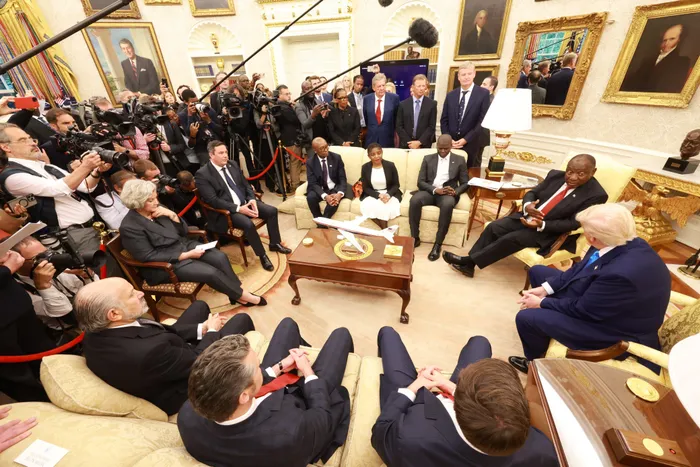Trump slaps 30% tariff on South African imports, analyst slams Ramaphosa’s US visit as ‘nonsense’

Political analyst Professor Sipho Seepe criticized President Ramaphosa’s handling of U.S. relations, calling the recent diplomatic visit to Washington “plain nonsense.”
Image: GCIS
US President Donald Trump’s decision to impose a 30% tariff on South African exports has drawn sharp criticism from political analysts, with one calling President Cyril Ramaphosa’s recent visit to Washington “plain nonsense.”
“First of all, what it says is that Donald Trump does what Donald Trump wants. And Donald Trump will create statistics or information that he wants to believe,” political analyst Professor Sipho Seepe told IOL News on Tuesday morning.
“It also shows that all this pretence that our visit to the White House was successful is just plain nonsense. Because when Donald Trump created South Africa, it was after the tariffs or the imposition of the new tariffs. It was after President Ramaphosa had gone to see him.”
The letter, dated July 7 and sent on official White House stationery, accuses South Africa of maintaining long-standing trade barriers and contributing to what Trump described as “unsustainable trade deficits against the United States.”
The blanket tariffs will apply to “any and all South African products sent into the United States” and are being implemented outside of any current trade agreements.
The announcement follows a wave of similar tariffs imposed on more than a dozen countries in recent weeks, with South Africa among the hardest hit.
Seepe said the move confirms that Ramaphosa’s May trip to Washington to repair diplomatic and trade ties was just a failure.
“So what this shows is that it was not successful. But also, we know as a matter of fact, it doesn’t matter to anybody who was there,” he said.
“A president who was very pathetic in engaging Donald Trump - he found himself at a loss for words. Even when he tried to bring the late President Nelson Mandela into the picture, Trump was not interested. Ramaphosa was almost powerless.”
“He was paralysed,” Seepe added.
He said Trump’s decision to impose tariffs reflects his personal disdain for South Africa’s leadership and policies.
“He’s also saying, ‘I’m going to make it difficult for people I do not agree with or countries I do not agree with,’” Seepe said.
“At the moment, South Africa under Ramaphosa has been reduced to a mere colony - it has been reduced to a begging bowl.”
“We simply go around begging. And again, after this, we are going to try to make Donald Trump understand that the statistics before him are not true. Donald Trump does not give a damn.”
In May, Ramaphosa led a high-level delegation to the White House to mend ties following growing diplomatic and economic tensions.
The meeting included senior officials and business leaders from both nations.
However, the visit took a turn when Trump played footage of Economic Freedom Fighters leader Julius Malema speaking about land reform and singing the controversial “Kill the Boer” chant.
Trump claimed the chant incited violence against white farmers and called for Malema’s arrest - a claim the EFF vehemently denied.
Malema has since vowed to continue using the chant.
US and South Africa relations have deteriorated during Trump’s second term, particularly over land reform policies, which Trump has labeled as a “seizure of land” from white farmers - a claim the South African government has rubbished..
Tensions escalated further in February when the US cut funding for HIV/AIDS programs in South Africa.
Asked whether the latest tariffs would further damage relations, Seepe responded, “No, no. I mean, there is no relationship. Ramaphosa wants to say we must talk as equal partners. That is a lot of nonsense...”
“There is no equal partner between South Africa and the United States. We are a mere colony, and that will be dictated by the United States,” he said.
Seepe said Trump’s criticisms of land expropriation, the alleged killing of white farmers, and Malema’s chant were likely the driving forces behind the tariff decision.
“Trump, if we were the darling of Trump, even those things he would overlook. But the point is, Trump will create whatever statistics or information suits him. The difference is, Trump is not begging us. We are begging Trump,” he said.
“This 30% tariff is based on a particular interpretation of the balance of trade between South Africa and the United States,” said presidential spokesperson Vincent Magwenya.
“This contested interpretation forms part of the issues under consideration by the negotiating teams from South Africa and the United States.”
Magwenya said South Africa disputes the US interpretation of the data.
“In our interpretation of the available trade data, the average tariff for imported goods entering South Africa stands at 7.6%,” he said.
“Importantly, 56% of goods enter South Africa at 0% most-favored nation tariff, with 77% of US goods entering the South African market under a 0% duty.”
The presidency said South Africa would continue working to improve trade relations with the United States.
“South Africa will continue with its diplomatic efforts toward a more balanced and mutually beneficial trade relationship,” Magwenya said.
“We welcome the commitment by the US government that the 30% tariff is subject to modification following the conclusion of negotiations.”
simon.majadibodu@iol.co.za
IOL Politics